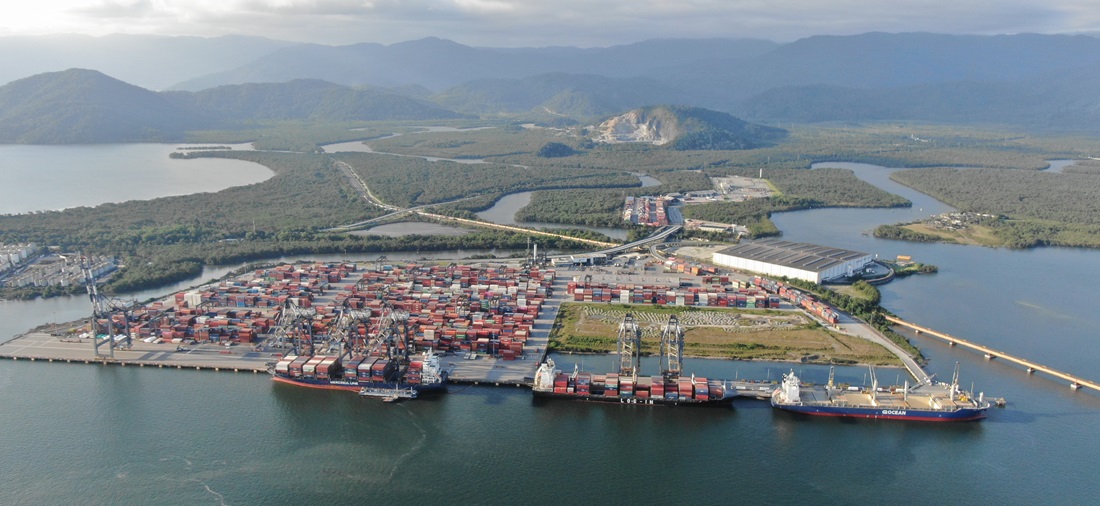
Proposed Amendment to End Federal Ownership of Marine Land Raises Concerns for Port Terminals
Jun, 06, 2024 Posted by Gabriel MalheirosWeek 202423
The Constitutional Amendment Proposal (PEC in Portuguese) 3/2022 is causing apprehension among business leaders in the port sector. They argue that Private Use Terminals (TUPs) would be directly affected by the amendment, popularly known as the Beach Amendment, which proposes ending Union ownership of marine land, transferring it to states and municipalities, and allowing private individuals to purchase these areas.
The proposal was approved by the Chamber of Deputies, Brazil’s Lower House, in 2022 and is currently under review by the Senate’s Constitution and Justice Committee (CCJ). No date has been set for the vote.
“While the justification for the proposal includes tax aspects and the modernization of legislation concerning marine land, all practical implications of a possible change to the constitutional text must be considered,” said an industry leader.
Barbosa also noted that if the Amendment is approved, “the purchase of marine areas by the occupants is not compulsory,” and added that “if the purchase path is pursued, the possibility of paying in installments should be offered.”
Caio Morei, the executive director of the Brazilian Association of Container Terminals (Abratec), alerted that the proposal could generate uncertainty, legal insecurity, and potentially increased costs to port terminals. “This measure would not create any efficiency gains or cost reductions, at a time when the sector needs actions to improve the regulatory environment to attract new investments.”
Carlos Kopittke, the executive president of the Brazilian Association of Liquid Terminals (ABTL), highlighted that, if approved, the PEC could “significantly impact port terminals,” including changes in the regulatory structure, investments and modernization, operational costs, tariffs, prices, and even labor issues.
Exception
Thiago Miller, a specialist in Port, Maritime, and Customs Law, explained that the PEC includes an exception for public ports. “Areas located in organized ports will remain under Union control, as they operate under a concession regime and provide public service,” he said.
Regarding port tariffs, Miller stated that “initially, direct interference is not envisaged. However, the greatest impacts may be felt by port facilities located outside the organized port, in private use terminals (TUPs), which operate under authorization by the federal government.”
Miller also pointed out that some impacts include the obligation to acquire the part under Union control (17% in the case of lease and up to 100% in the case of occupation), without details on the financial burden this will place on the terminals.
“This will impact the prices charged at TUPs. It seems that the activity of TUPs was not fully considered in the format of the PEC, creating legal uncertainty in the sector,” he concluded.
Political opposition
Three out of four federal deputies representing the Santos Region in the Brazilian equivalent of the House of Representatives oppose PEC 3/2022, despite advocating for the abolition of the Union fee on marine land, which would be a natural consequence of the lost ownership of these areas as the PEC proposes.
Federal Deputy Alberto Mourão argues for the end of the Union fee, which he deems “absurd.” However, he believes the current PEC is too vague.
“We might end up with beaches inaccessible to the public, and beaches are a public asset. If a beachfront property owner can buy that area, we’ll have private beaches,” Mourão stated.
Mourão insists the PEC needs revision. “The Senate should reject this proposal or significantly improve it to prevent larger issues.”
Federal Deputy Paulo Alexandre Barbosa (PSDB) expresses strong opposition to any privatization of beaches, calling them “the most democratic spaces in our society.”
Regarding marine land fees, Barbosa emphasizes his full support for abolishing the federal fee, not only along the coastline but also in mangrove areas like those present in Northwest Santos.
Federal Deputy Rosana Valle (PL) notes that over 530,000 properties in Brazil are currently required to pay the Union fee, which she considers “an unjust and senseless tax levied on people from all social classes living near the sea, rivers, and mangroves, including a large portion of the population.”
Valle stresses that beaches are common-use assets defined by the Coastal Management Plan of 1988. “I support keeping the beaches public and ensuring preservation areas remain protected and free from real estate exploitation.”
Source: A Tribuna
Click here to read the original news report: https://www.atribuna.com.br/noticias/portomar/pec-que-autoriza-venda-de-areas-de-marinha-pode-afetar-terminais-portuarios-1.422016
-
Other Cargo
Jun, 23, 2022
0
US urges countries to seek them out in case of importation problems created by sanctions
-
Other Logistics
May, 25, 2021
0
VLI will transport cellulose from LD for 30 years
-
Ports and Terminals
Dec, 15, 2021
0
REPORTO special tax regime divides Ministries of Economy and Infrastructure
-
Economy
Dec, 23, 2024
0
Latin America, Caribbean economies expected to grow 2.4% in 2025, UN says



